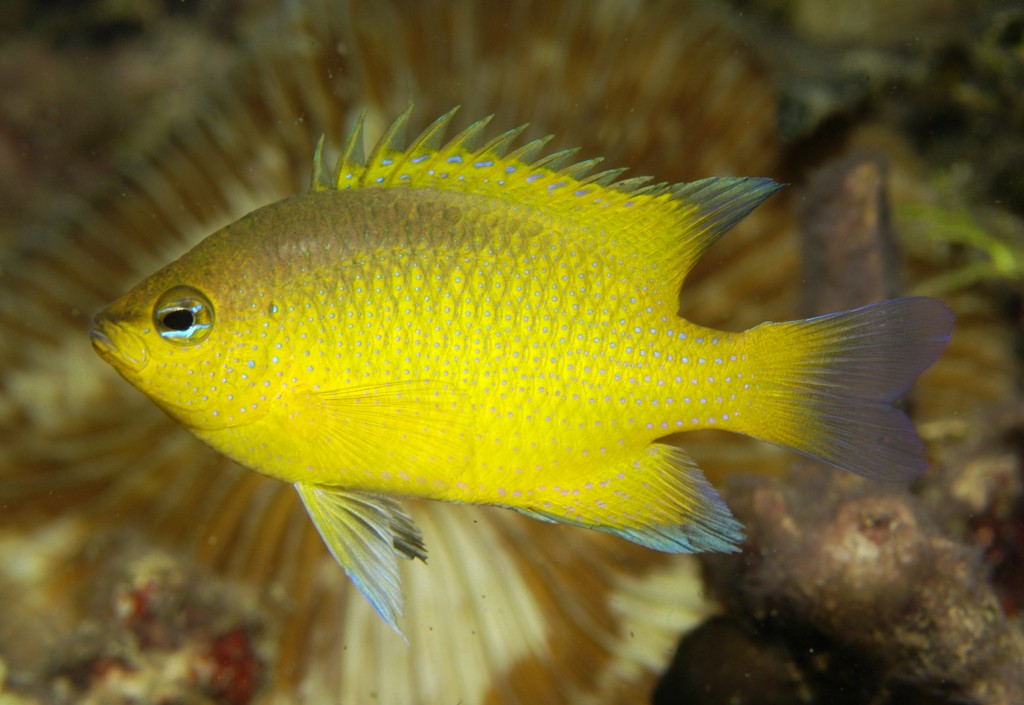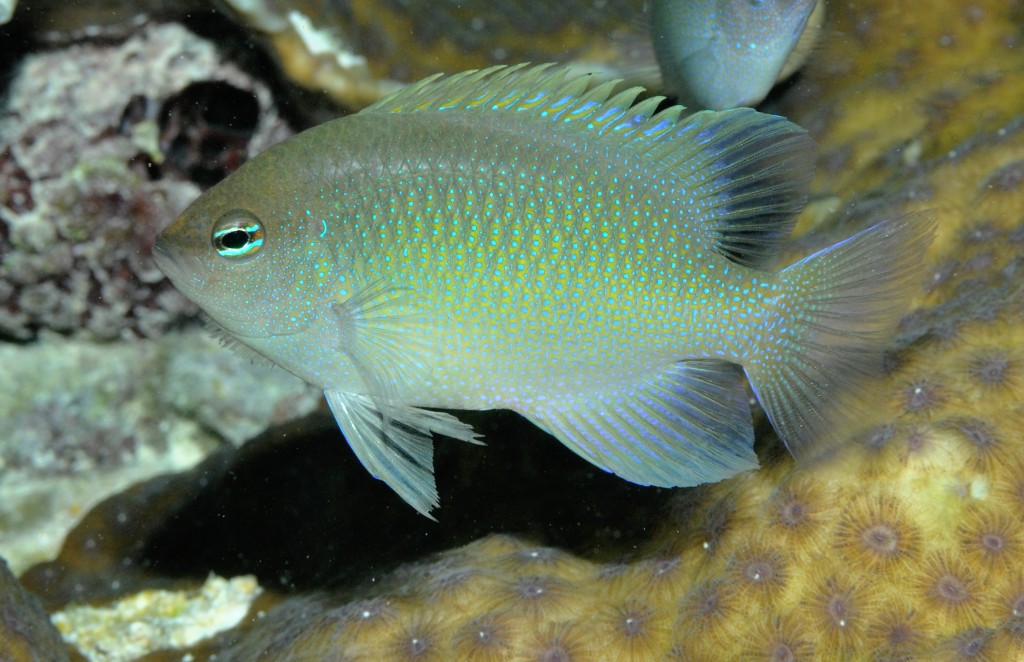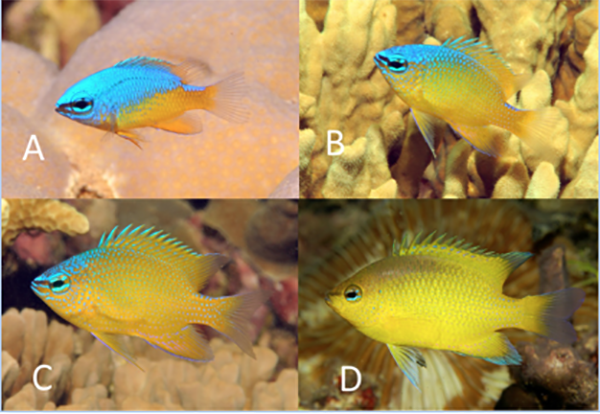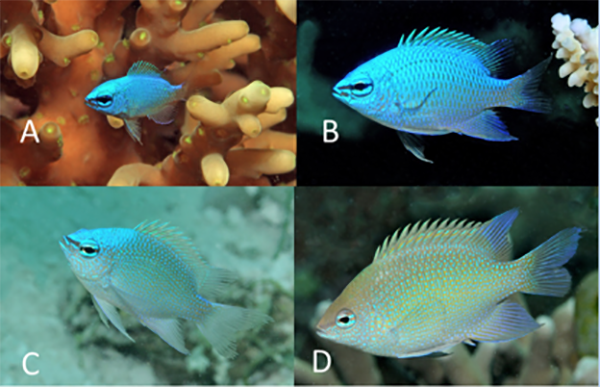Marine Life & Conservation
Two new BHS damsels named to honor two diving divas

It’s an honor and a great pleasure to announce the recent description of two new BHS endemic damselfishes, named after diving divas Maurine Shimlock and Dr. Ellen Gritz. The two beautiful new fish species were previously considered geographic color variants of the damselfish Chrysiptera oxycephala, but genetic analysis by our colleague Dita Cahyani from the Indonesian Biodiversity Research Centre has shown conclusively that the Cendrawasih Bay and Raja Ampat populations actually represent separate species.
With this genetic evidence in hand, my colleague Gerry Allen and I were delighted to describe the gorgeous lemon-yellow damsel from Cendrawasih Bay after our dear friend Maurine Shimlock. Given Maurine’s tireless efforts to explore and promote the Bird’s Head, and especially Cendrawasih Bay, naming a Cendrawasih endemic after her seemed a most fitting tribute! As an added bonus, this fish is common on the shallow reefs of Cendrawasih – which means Maurine won’t need to dive to 70m (where many of our new species finds come from nowadays!) to see her piscine namesake.

Chrysiptera ellenae – Ellen’s damselfish, found on shallow protected reefs of Raja Ampat including Wayag and Ayau lagoons, Kri lagoon, and the karst channels of SE Misool. MV Erdmann photo.
Similarly, we were also very pleased to be able to name the new Raja Ampat damsel Chrysiptera ellenae in honor of Dr. Ellen Gritz – a world-renowned cancer researcher who also happens to be a good friend and a generous supporter of the Bird’s Head Seascape. This seemed a particularly appropriate fish to name after Ellen, given its beautiful blue coloration (Ellen’s favorite!) and the fact that it is a sibling species to C. maurinae (Maurine and Ellen have been diving buddies for years!).

Life history stages of C. maurinae, where the neon blue crest in the juvenile gradually disappears to reveal a gorgeous lemon yellow adult. Photos GR Allen.

Life history stages of C. ellenae, showing the gradual change from neon blue juvenile to greenish-blue adults. Photos GR Allen.
Both of these new species are found in close association with branching coral colonies on shallow sheltered reefs. This includes the majority of Cendrawasih’s mainland reefs for C. maurinae, and mostly lagoonal areas (such as the lagoons of Wayag, Ayau, Kri and SE Misool’s Mesempta karst channels) for C. ellenae in Raja Ampat. Both species also show significant colour changes over the course of their lifetime; C. maurinae has a neon blue upper body and bright yellow lower half as a juvenile, but over time the blue gradually disappears and the adults are bright yellow. By comparison, C. ellenae exhibits a striking neon blue juvenile phase, gradually changing to a more greenish-blue as it matures.
With the addition of these two new species, the total count for the Bird’s Head rises to 1759 reef fish species recorded, including 1563 species from Raja Ampat, 1044 from Cendrawasih, and 1053 from the FakFak-Kaimana coastline. Perhaps 2016 will be the year we break the 1800 species mark for the Bird’s Head! In the meantime, if you’re fortunate enough to be diving in Raja Ampat or Cendrawasih this year, keep a lookout for the latest two endemic fishes from the Bird’s Head!
For more information about Bird’s Head Seascape visit www.birdsheadseascape.com.
Marine Life & Conservation
Double Bubble for Basking Sharks

 The Shark Trust is excited to announce that, for two more days only, all donations, large or small, will be doubled in the Big Give Green Match Fund!
The Shark Trust is excited to announce that, for two more days only, all donations, large or small, will be doubled in the Big Give Green Match Fund!
Donate to Basking in Nature: Sighting Giants
The Shark Trust is hoping to raise £10k which will be doubled to £20k. This will go towards Basking in Nature: Sighting Giants. And they need YOUR help to reach they’re goal.
The Shark Trust’s citizen science project is to monitor and assess basking sharks through sightings; encouraging data collection, community engagement, and promoting nature accessibility. This initiative aims to enhance health and wellbeing by fostering a deeper connection with British Sharks.
Campaign Aims
- Increase citizen science reporting of Basking Sharks and other shark sightings to help inform shark and ray conservation.
- Provide educational talks about the diverse range of sharks and rays in British waters and accessible identification guides!
- Create engaging and fun information panels on how to ID the amazing sharks and rays we have on our doorstep! These can be used on coastal paths around the Southwest. With activities and information on how you can make a difference for sharks and rays!
- Promote mental wellbeing through increasing time in nature and discovering the wonders beneath the waves!
Donate, and double your impact. Click Here
Marine Life & Conservation
Leading UK-based shark conservation charity, the Shark Trust, is delighted to announce tour operator Diverse Travel as a Corporate Patron

 Corporate Patrons provide a valuable boost to the work of The Shark Trust. The Trust team works globally to safeguard the future of sharks, and their close cousins, the skates and rays, engaging with a global network of scientists, policymakers, conservation professionals, businesses and supporters to further shark conservation.
Corporate Patrons provide a valuable boost to the work of The Shark Trust. The Trust team works globally to safeguard the future of sharks, and their close cousins, the skates and rays, engaging with a global network of scientists, policymakers, conservation professionals, businesses and supporters to further shark conservation.
Specialist tour operator Diverse Travel has operated since 2014 and is committed to offering its guests high quality, sustainable scuba diving holidays worldwide. Working together with the Shark Trust will enable both organisations to widen engagement and encourage divers and snorkellers to actively get involved in shark conservation.
“Sharks are truly at the heart of every diver and at Diverse Travel, we absolutely share that passion. There is nothing like seeing a shark in the wild – it’s a moment that stays with you forever!” says Holly Bredin, Sales & Marketing Manager, Diverse Travel.
“We’re delighted to celebrate our 10th year of business by becoming a Corporate Patron of the Shark Trust. This is an exciting partnership for Diverse and our guests. We will be donating on behalf of every person who books a holiday with us to contribute towards their vital shark conservation initiatives around the world. We will also be working together with the Trust to inspire divers, snorkellers and other travellers to take an active role – at home and abroad – in citizen science projects and other activities.”
Paul Cox, CEO of The Shark Trust, said:
“It’s an exciting partnership and we’re thrilled to be working with Diverse Travel to enable more divers and travellers to get involved with sharks and shark conservation. Sharks face considerable conservation challenges but, through collaboration and collective action, we can secure a brighter future for sharks and their ocean home. This new partnership takes us one more valuable step towards that goal.”
For more information about the Shark Trust visit their website here.
For more about Diverse Travel click here.
-

 News3 months ago
News3 months agoHone your underwater photography skills with Alphamarine Photography at Red Sea Diving Safari in March
-

 News3 months ago
News3 months agoCapturing Critters in Lembeh Underwater Photography Workshop 2024: Event Roundup
-

 Marine Life & Conservation Blogs2 months ago
Marine Life & Conservation Blogs2 months agoCreature Feature: Swell Sharks
-

 Blogs2 months ago
Blogs2 months agoMurex Resorts: Passport to Paradise!
-

 Blogs2 months ago
Blogs2 months agoDiver Discovering Whale Skeletons Beneath Ice Judged World’s Best Underwater Photograph
-

 Gear Reviews3 months ago
Gear Reviews3 months agoGear Review: Oceanic+ Dive Housing for iPhone
-

 Marine Life & Conservation2 months ago
Marine Life & Conservation2 months agoSave the Manatee Club launches brand new webcams at Silver Springs State Park, Florida
-

 News3 months ago
News3 months agoWorld’s Best Underwater Photographers Unveil Breathtaking Images at World Shootout 2023






